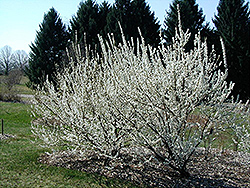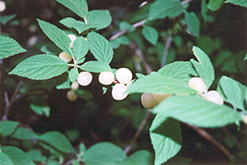It's all about ...
plants

White Nanking Cherry
Prunus tomentosa 'Leucocarpa'
Height: 8 feet
Spread: 10 feet
Sunlight:
![]()
Hardiness Zone: 2a
Description:
A spreading shrub covered in showy light pink flowers in early spring before the leaves followed by delicious sweet white cherries, quite unique, also interesting peeling reddish-brown bark; a great tall accent or screening shrub, needs well-drained soil
Edible Qualities
White Nanking Cherry is a medium-sized shrub that is commonly grown for its edible qualities, although it does have ornamental merits as well. It produces small white round fruit (technically 'drupes') which are usually ready for picking in mid summer. Note that the fruits have hard inedible pits inside which must be removed before eating or processing. The fruits have a sweet taste and a juicy texture.
The fruit are most often used in the following ways:
- Fresh Eating
- Baking
- Preserves
- Wine-Making
Features & Attributes
White Nanking Cherry is clothed in stunning fragrant white flowers along the branches in early spring, which emerge from distinctive shell pink flower buds before the leaves. It has green deciduous foliage. The fuzzy pointy leaves turn yellow in fall. The fruits are showy white drupes carried in abundance in mid summer.
This is a multi-stemmed deciduous shrub with a more or less rounded form. Its average texture blends into the landscape, but can be balanced by one or two finer or coarser trees or shrubs for an effective composition. This is a relatively low maintenance plant, and should only be pruned after flowering to avoid removing any of the current season's flowers. It is a good choice for attracting birds to your yard. It has no significant negative characteristics.
Aside from its primary use as an edible, White Nanking Cherry is sutiable for the following landscape applications;
- Mass Planting
- Hedges/Screening
- General Garden Use
- Orchard/Edible Landscaping
Planting & Growing
White Nanking Cherry will grow to be about 8 feet tall at maturity, with a spread of 10 feet. It tends to fill out right to the ground and therefore doesn't necessarily require facer plants in front, and is suitable for planting under power lines. It grows at a medium rate, and under ideal conditions can be expected to live for approximately 30 years. This variety requires a different selection of the same species growing nearby in order to set fruit.
This shrub is quite ornamental as well as edible, and is as much at home in a landscape or flower garden as it is in a designated edibles garden. It should only be grown in full sunlight. It does best in average to evenly moist conditions, but will not tolerate standing water. It is not particular as to soil type or pH. It is highly tolerant of urban pollution and will even thrive in inner city environments. This is a selected variety of a species not originally from North America.

